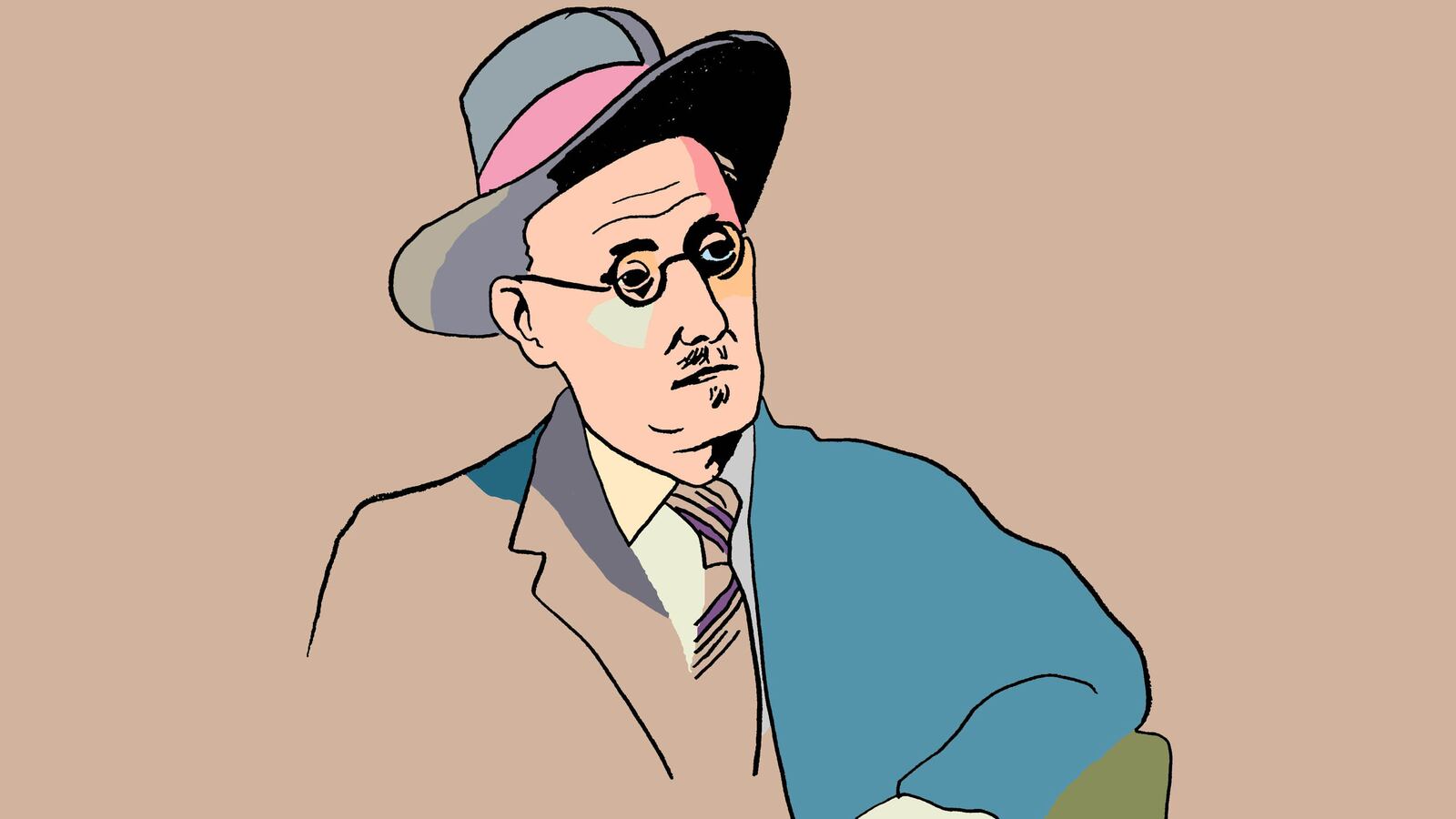The keenest gauge of a work of art's greatness is the influence it wields long after its debut. Any genuinely groundbreaking effort—think Madame Bovary, The Rite of Spring, Georgia O'Keeffe's Black Iris III, the Stooges' Raw Power—will spark praise, antipathy, even awe, while laying down a challenge to everyone, artist or otherwise, who follows: "You have to confront this. Love it or hate it, you can't ignore it."
By that measure, Ulysses remains the most influential—the most unignorable—English-language novel of the past century. Allusive, earthy, impressionistic and, on every page, utterly original, James Joyce's signature work has earned avid admirers and head-scratching detractors ever since it first appeared in 1922. This year on June 16, as readers around the world celebrate Bloomsday—commemorating a late spring evening in 1904 when Joyce first "went out walking" with his wife-to-be, Nora Barnacle, and the date on which the book's action unfolds—let's toast not just the novel itself, but a trial court opinion in a landmark First Amendment case that, in effect, set Ulysses free forever.
Written by Judge John M. Woolsey, who presided in the Southern District of New York from the late ’20s until his death in 1945, the December 1933 opinion that lifted the ban on the printing and selling of Ulysses in the U.S. is not just a legal touchstone (although it certainly is that). Clocking in at fewer than 2,000 words Woolsey's decision in United States v. One Book Called 'Ulysses' is also that rarest of judicial writings: a momentous opinion that is succinct, humane, and terrifically readable in its own right.
Tracking down "Opinion A. 110-5" of the Southern District court, meanwhile, isn't too difficult. It's readily available online, of course, and is included in hundreds of thousands of copies of Ulysses published by Random House over the past nine decades, making it perhaps the most widely distributed legal decision ever written.
The bare-bones version of the obscenity case before Woolsey looks like this: Random House, as the claimant, was fighting the American government's position that 1) the novel was obscene under terms of the Tariff Act of 1930; that 2) as an obscene work, it was "not importable into the United States"; and that 3) all copies were therefore "subject to seizure, forfeiture, confiscation and destruction." If Woolsey found for the claimant, Ulysses would finally be legally available in the U.S., a decade after it was first published in Paris by the Maryland-born bookseller and champion of modernist literature, Sylvia Beach.
But as Kevin Birmingham noted in his lively 2014 study, The Most Dangerous Book: The Battle for James Joyce's ‘Ulysses', it would not be enough for Random House to merely win the case. "Their victory," Birmingham wrote, "would have to be resounding." With Woolsey's decision, it was. The government appealed, of course—everyone knew it would—and one year later duly lost again when a three-judge appeals panel affirmed Woolsey's opinion. (It's worth recalling that the panel's decision was not unanimous, and even the justice writing for the two-person majority felt compelled to hedge somewhat on the artistic merits of Joyce's novel: "It may be that Ulysses will not last as a substantial contribution to literature," wrote Augustus Hand, who joined with his cousin, the famed Judge Learned Hand, in upholding Woolsey, "and it is certainly easy to believe that, in spite of the opinion of Joyce's laudators, the immortals will still reign….")

What's especially striking, at first, about Woolsey's original decision is the incisiveness of his literary observations. (Woolsey read the novel "once in its entirety," he wrote in his opinion, "and ... those passages of which the Government particularly complains several times.")
After declaring that "in spite of its unusual frankness, I do not detect anywhere the leer of the sensualist" in Ulysses, Woolsey explains that in writing the book, Joyce "takes persons of the lower middle class living in Dublin in 1904 and seeks not only to describe what they did on a certain day early in June of that year … but also to tell what many of them thought about the while.
"Joyce," he continues, "has attempted—it seems to me, with astonishing success—to show how the screen of consciousness with its ever-shifting kaleidoscopic impressions carries, as it were on a plastic palimpsest, not only what is in the focus of each man's observation of the actual things about him, but also in a penumbral zone residua of past impressions, some recent and some drawn up by association from the domain of the subconscious."
Entire books have been written about Ulysses that fail to capture Joyce's aesthetic intent as neatly as Woolsey manages in that one, short paragraph.
Judge Woolsey rounds off his discussion of the carnal daydreams and lyrical musings of the book's characters—including its cuckolded hero and Bloomsday namesake, Leopold Bloom—with what is likely the single most memorable admonition in the American legal canon: "In respect of the recurrent emergence of the theme of sex in the minds of Joyce's characters, it must always be remembered that his locale was Celtic and his season Spring."
Woolsey's insights into Joyce's art, meanwhile, serve to bolster his decision that Ulysses may be admitted into the United States:
"[M]y considered opinion, after long reflection, is that whilst in many places the effect of Ulysses on the reader undoubtedly is somewhat emetic, nowhere does it tend to be an aphrodisiac."
Louis Sirkin, a First Amendment attorney for more than 50 years (he famously defended Dennis Barrie against obscenity charges for displaying Robert Mapplethorpe photos in Cincinnati a quarter-century ago), recently told me that Woolsey's "very fortunate opinion" is noteworthy not only for its intellectual rigor, but because the judge's approach to the material in question was, in its own way, all-encompassing.
"Woolsey looked at Ulysses as a whole," Sirkin said, "not just at isolated passages. He appreciated that he had to consider the artist's work, and not his subject matter. It's important to pay attention to what people do and say, how they actually act, and record it. That's what Joyce did so brilliantly, and Woolsey understood that."
By all means, celebrate Bloomsday this year. But acknowledge, too, that the forces of censorship will always be with us, trying to tell us what we can and can't read, watch, think, and feel. If today we enjoy a bulwark against those forces, thanks are due in large part to a legal opinion crafted generations ago by an American named Woolsey; the genius of a self-exiled Irishman named Joyce; and the undimmed influence of a modernist masterpiece called Ulysses.






